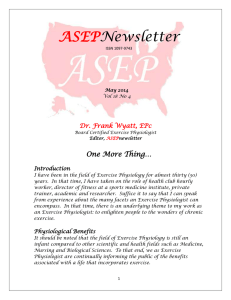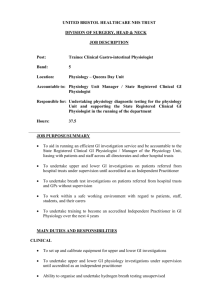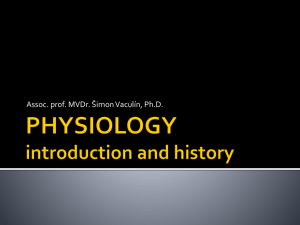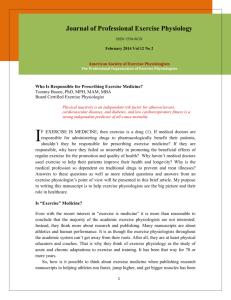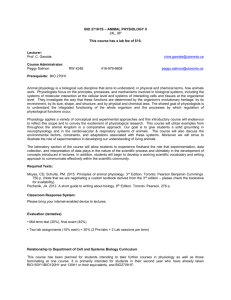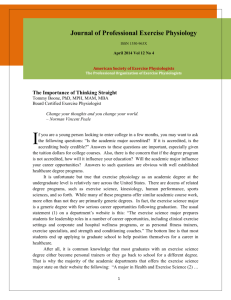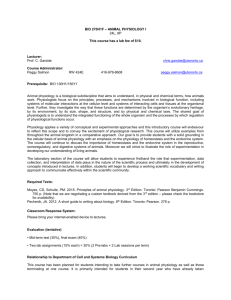Exercise Physiologist
advertisement
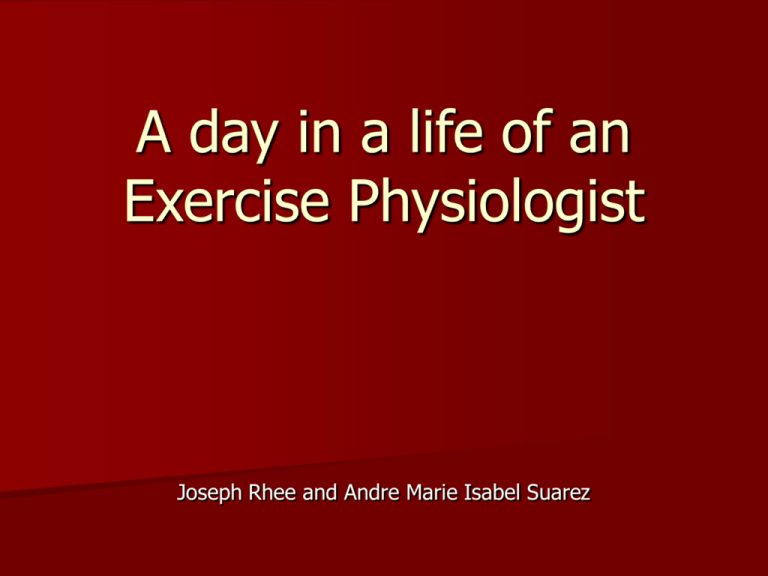
A day in a life of an Exercise Physiologist Joseph Rhee and Andre Marie Isabel Suarez Exercise Physiology…What is that? A field of sports medicine that involves the study of the body's response to physical stress, comprising the science of fitness, the preservation of fitness, and the role of fitness in preventing and treating disease. Exercise physiology is the study of the function of the human body during various acute and chronic exercise conditions Exercise Physiologist conduct fitness evaluations when a person undergoes physical activity. How do you become one? Graduate elementary, junior and high school Apply to a four year college with a strong exercise science program and then graduate with a bachelor’s degree in exercise science or exercise physiology. Quality students have a minimum of 2 years of chemistry (inorganic, organic), one year of physics, anatomy and physiology, biochemistry, cell physiology, kinesiology, exercise physiology, etc. Internship at a hospital or health care facility. Study for and pass the Exercise Physiologist Certified exam given by the American Society of Exercise Physiologists. Increase your chances of becoming an exercise physiologist by furthering your higher education and earning a Master's Degree Go for Doctoral Degree Done Taking It To The Next Level Once a clinical exercise physiologist, register with the American College of Sports Medicine after earning a master’s degree, passing an exam and gaining at least 12,000 internship hours. The organization also certifies physiologists as exercise specialists if they have a bachelor’s degree or equivalent experience, pass an exam and gain at least 600 hours of hospital experience. American Society of Exercise Physiologists offers an exercise physiologist certification for workers who have a bachelor’s degree in the field and pass an exam. To keep certification current, exercise physiologist must take continuing education classes. What do they do? Study for an exercise physiologist is diverse. Some scientists research in how activity patterns affect disease states that are common in today's society such as: heart disease, cancer, hypertension, diabetes. Whereas others in this area of study discover ways of performing athletic improvement. Goes out into community to conduct health screenings and exercise education classes Check blood pressure, body composition, and strength. Teach people about the importance of exercise and good nutrition. Analyze each athlete’s sport and design an exercise program tailored to that sport. Prescribe exercise programs, monitor patients while they exercise and track each person's progress. Where can you find them? Hospitals Recreation Centers Physical Therapy Clinics Sports Medicine Clinics Fitness Centers Corporations Schools Salary, Yearly Income The Bureau of Labor Statistics does not collect data on exercise physiologists. Salaries vary widely, based on where exercise physiologists work. Most earn between $38,000 to $49,000 annually. Megan Lukenbill What patients do you usually deal with? As an exercise physiologist, I help cardiac patients develop stronger hearts, emphysema patients healthier lungs and arthritic patients develop more painless movements. What type of facility do you work at? I work in Kosciusko Community Hospital, dealing more with athletes and a couple elderly from around the area. Do you have a procedure dealing with athletes? When someone comes to the center, I first conduct a fitness test to asses his or her physical condition. I put them on the treadmill connected to EKG machine, to track their heart rate and rhythm, as well as track oxygen in the blood. How do you deal with the elderly who cannot do so much physical activity? Dealing with elderly, I let them use weights and other instruments to measure their strength and flexibility. So You Want to Be A Exercise Physiologist? here’s some tips! Professional registration and certification increases exercise physiologists’ employment opportunities. Build your social network. A college may have either an Exercise Science or Exercise Physiology major, both of which are acceptable for this career choice. Accept as many internship opportunities in the field as you can while in school. Do not pursue a career in exercise physiology if you do not like to work directly with people.
